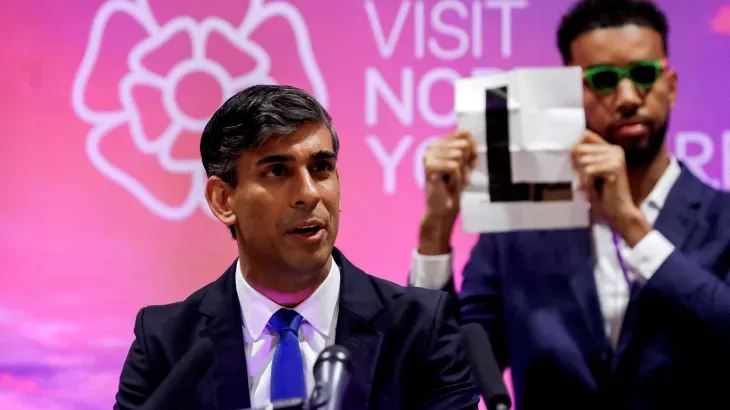Table of Contents
Republished with Permission
Author: Peter Allan Williams Peter Williams https://peterallanwilliams.substack.com/
It’s intriguing to arrive in a foreign land on the eve of their General Election.
Just why the United Kingdom votes on a Thursday has always been a bit of a mystery but it certainly adds to the low key nature of the day.
Peter’s Substack is a reader-supported publication. To receive new posts and support my work, consider becoming a free or paid subscriber.
We’re staying in East London, home to the long serving Diane Abbot’s Labour-dominated constituency of Hackney and Stoke Newington.
My daughter and son-in-law enthusiastically voted for her to ensure a huge majority yet again for Britain’s first black woman MP. She’s held the seat since 1987and this time scored a whopping 59.5 percent of the votes cast in her ethnically diverse seat.
(Dad’s opinion didn’t matter in the slightest. The family were horrified to hear that if I was eligible I’d consider voting for Nigel Farage’s Reform!)
But as my wife and I walked around our neighbourhood and then into Central London on Election Day itself, the sense of this being just another ordinary working day was hard to miss.
Unlike in New Zealand where polling booths seem ubiquitous, and the orange signs are hard to miss, the signage here is black and white, not as prominent, and the frequency of booths seems lower than at home.
While we saw some polling stations out in the residential areas, they were invisible in the middle of town. On Thursday we did the tourist/shopping thing and spent a few hours on Regent and Oxford Streets and along Piccadilly. Didn’t see a polling booth.
The process, according to my family, is simple. There is just one vote to make – that for the local constituency MP in Britain’s first past the post (FPP) electoral system.
You can vote outside your local constituency but there’s no enrolling on the day. The UK Electoral Commission stopped enrollments on June 17. If you weren’t on the roll by then, you couldn’t vote.
What a good, clean and simplified system. We should learn from it.
On the day itself, it seems that any mention of the election in a public place or in the media is taboo.
The Election Day tradition in New Zealand is for the 6pm news to lead with a story about how the population has gone to the polls, booths close in an hour, there’s invariably a few comments from returning officers about turnout, and then of course coverage of the party leaders casting their vote and commenting on their way out of the booth.
The BBC Six O’Clock News headlines showed how the rules are different here. I watched the start of the bulletin before going out the back for the family barbecue. The teasers at the top of the show were about an attempted murder of a celebrity and what had happened at Wimbledon that day.
Then there’s the extraordinarily late closing of the polling booths. Even though the country is in one time zone, the reality of weekday business allows for voters to cast their ballot right up till 10pm.
Apart from the FPP system, the other huge difference on Election Day here is the Exit Poll.
While my son-in-law told me there are signs up around the polling booth emphasizing how your vote is your business, and how you should not tell nobody else how you voted, around 20,000 electors across the country took part in an exit poll. That was reported enthusiastically by the BBC just after their Election Night coverage began at 9.55pm.
Even though the opinion polls had been predicting a huge Labour win for months, the Exit Poll – which is actually more realistic for a Proportional Representation (PR) system – merely confirmed what would unfold over the next few hours.
But Labour’s utter domination of the result, winning 411 out of 650 seats in the House of Commons, belies the reality that Britain is a politically divided nation.
Despite winning 63 percent of the seats, Labour did it with just 34 percent of the popular vote. Remember also that turnout was a measly 60 percent, the third worst in UK electoral history. So here is a party with a rampant majority to pass whatever legislation they want, taking power after barely 20 percent of the eligible electorate supported them.
As Nigel Farage’s party chairman Richard Tice has pointed out, Labour received roughly two and half times as many votes as Reform but have 50 times the number of MPs. The Tories’ numbers were 50 percent more votes but 10 times the MPs, and the Liberal Democrats 30 percent FEWER votes across the country than Reform but have six times the number of MPs.
What is patently obvious is that the FPP system will now come under more scrutiny here than ever before. Whether or not the long standing two or three party domination of the Commons can ever bring itself to devolve to some sort of PR such as our MMP is highly problematic.
The old saying about turkeys and Christmas comes to mind. FPP has been part of British parliamentary politics since 1707. Change has been resisted for three centuries but a result such as this, plus the political genius of Nigel Farage, may finally bring some change. It won’t happen quickly though.
For the next five years Labour can do what it wants. There will be significant tax increases. But my family sample say that’s for the better.
They’re about to send their oldest to a fee paying private school. The new Prime Minister has promised to slap VAT, the equivalent of GST, on private school fees. Apparently it’s for the good of the country.
I’m a guest here. It’s better to keep my mouth shut.
Peter’s Substack is a reader-supported publication. To receive new posts and support my work, consider becoming a free or paid subscriber.







